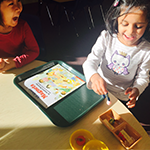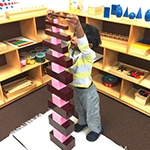Approach to Montessori Education

Maria Montessori Philosophy
The widely acclaimed Montessori educational philosophy was developed by Italian physician, Dr. Maria Montessori in 1907. According to Montessori, the ages from birth till 6 years old are crucial in building the foundation of what will become the future child. And it is important, therefore, to fill those years with the right learning experiences, knowledge and the joy of discovery.
Montessori believed that children have a unique capacity to absorb even complex information if presented in a simplistic way. Accordingly, she used her years of educational research to design and create unique Montessori materials to serve that need. Some examples of her materials include multiplication boards that use beads and a wooden board to explain the basic concept of multiplication; the movable alphabet that allows children to use wooden letters to form words and sentences, or the peace rose that teaches children how to resolve conflicts peacefully. Montessori also laid a huge emphasis on learning from and about nature and the living world around us. Experiments, observing lifecycles of plants and animals, learning about continents and cultures are all part of the Montessori experience.

Learning by Exploring
All materials are presented in a sequential manner in classrooms that are brightly lit, inviting spaces that Montessori referred to as "prepared environments".
An authentic Montessori program features multi-age groupings that foster peer learning, uninterrupted blocks of work time and guided choice of work activity. Teachers guide rather than instruct, offering activities that meet each child’s interests and needs. Classrooms are designed to allow movement and collaboration while also promoting concentration, independence and a sense of order.
The prepared environments and the role the teacher plays in the classroom distinguish Montessori from other educational approaches.
They also offer practical occasions for introducing social relationships through free interaction. The logical, sequential nature of the environment provides orderly structures that guide discovery. For instance, theorems are discovered, not presented; spelling rules are derived through recognition of patterns, not merely memorized. Every aspect of the curriculum involves creative invention and careful, thoughtful analysis. In a Montessori classroom, the emphasis is on how students learn something, not the mere memorization of facts. Helping students discover how they learn at an early age helps them become more adept, inspired learners.